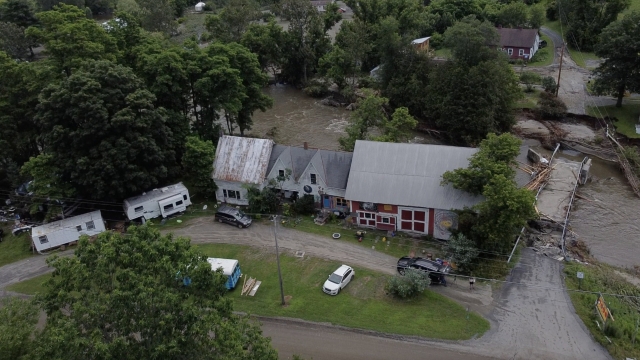As the water rushed into her home, Amy Rodger could do little else but watch in disbelief last week. Before she had time to react, 6 feet of water filled the first floor of her Barre, Vermont, home. A lifelong Vermont resident, Rodger is just one of countless residents across this state now cleaning up after historic flooding ravaged the state.
"I don't even know where to begin," Rodger said, looking at the mud which now covered her home.
Like so many homeowners across Vermont, catastrophic flash flooding left Rodger in shock. But now, this latest natural disaster in America is serving as a reminder about the importance of flood insurance.
"People are getting in situations where severe weather events are becoming more common," said Mark Browne, who teaches risk management at St. Johns University in New York.
SEE MORE: Extreme rainfall drives near-record flooding in the Northeast
In the United States, flood insurance is managed by FEMA under the National Flood Insurance Program (NFIP). Coverage is delivered to the public by a network of more than 50 insurance companies.
Since the 1960s, the federal government has underwritten all coverage plans because flood insurance is so inherently risky. No private insurers in the United States will take on the costs alone.
"I think people really need to have a good risk management plan in place," Browne added.
Most NFIP policies only provide up to $250,000 in repairs. Browne says that is part of the reason why many homeowners should be looking into supplemental coverage. Especially as climate change only increases the frequency of flood events.
"Events are hitting in places that are not in foremost on people's mind. A lot of people weren't thinking about severe flooding in Vermont or cars washed away in Philadelphia," he noted.
Something else is happening in the insurance market. Many companies are leaving states that are too expensive to insure. In Louisiana, more than two dozen insurance companies have either gone insolvent or withdrawn from the market entirely over the last decade.
"Climate change is killing us. We're getting more violent, larger rain storms," noted University of Maryland Professor Gregory Baecher.
SEE MORE: Homeowner insurance rates skyrocket in waterfront areas in the South
It's not just homeowners facing losses though. In Vermont, preliminary estimates are that 7,000 acres of farmland were flooded during last week's catastrophic rainfall event.
"It hit right when those crops were headed to farmers' markets, farm stands, retail operations, supermarkets," said Anson Tebbetts, Vermont's Secretary of Agriculture.
Vermont has setup emergency funds for farmers seeking assistance. The state is also working to provide drone access for farmers trying to document damage.
"We are hoping to deploy those dollars quicker to those farmers, to get to cash quickly," Tebbetts added.
FEMA is currently inspecting areas of Vermont that were hit hard by flooding. It could take months for them to determine how much aid individual homeowners are eligible for.
Trending stories at Scrippsnews.com





